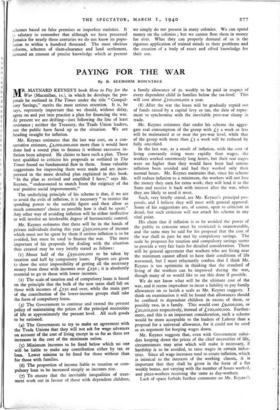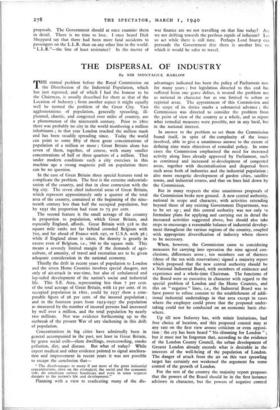PAYING FOR THE WAR
By B. SEEBOHM ROWNTREE
MR. MAYNARD KEYNES'S book How to Pay for the War (Macmillan, is.), in which he develops the pro- posals he outlined in The Times under the title " Compul- sory Savings," merits the most serious attention. It is, he says, supremely important that we should, without delay, agree on and put into practice a plan for financing the war. At present we are drifting—just following the line of least resistance ; neither the Treasury, the Trade Union leaders, nor the public have faced up to the situation. We are heading straight for inflation.
Mr. Keynes estimates that the last war cost, on a con- servative estimate, £2,000,000,000 more than it would have done had a sound plan to finance it without excessive in- flation been adopted. He claims to have such a plan. Those best qualified to criticise his proposals as outlined in The Times found no fundamental flaw in them. Some valuable suggestions for improving them were made and are incor- porated in the more detailed plan explained in this book. " In the plan as revised and amplified I have," says Mr. Keynes, " endeavoured to snatch from the exigency of the war positive social improvements."
The underlying principle of his scheme is that, if we are to avoid the evils of inflation, it is necessary " to restrict the spending power to the suitable figure and then allow as much consumers' choice as possible how it shall be spent." Any other way of avoiding inflation will be either ineffective or will involve an intolerable degree of bureaucratic control.
Mr. Keynes estimates that there will be in the hands of private individuals during this year £950,000,000 of income which must not be spent by them if serious inflation is to be avoided, but must be used to finance the war. The more important of his proposals for dealing with the situation thus created may be very briefly stated as follows: (t) About half of the £950,000,000 to be taken by taxation and half by compulsory loans. Figures are given ta show the utter impossibility of getting all the necessary money from those with incomes over £250 ; it is absolutely essential to go to those with lower incomes.
(2) The scale of taxation and of compulsory loans is based on the principle that the bulk of the new taxes shall fall on those with incomes of £250 and over, while the main part of the contribution of the lower-income groups shall take the form of compulsory loans.
(3) The Government to continue and extend the present policy of maintaining the prices of the principal necessities of life at approximately the present level. All such goods to be rationed.
(4) The Government to try to make an agreement with the Trade Unions that they will not ask for wage advances on account of the cost of living except in so far as there are increases in the cost of the minimum ration.
(5) Minimum incomes to be fixed below which no one will be liable to make any contribution either by tax or loan. Lower minima to be fixed for those without than for those with families.
(6) The proportion of income liable to taxation or com- pulsory loan to be increased steeply as incomes rise.
(7) To -ensure that the inevitable inequalities of treat- ment work out in favour of those with dependent children, a family allowance of 5s. weekly to be paid in respect of every dependent child in families below the tax-level. This will cost about £100,000,000 a year.
(8) After the war the loans will be gradually repaid out of funds raised by a capital levy or tax, the date of repay- ment to synchronise with the inevitable post-war slump in trade.
Mr. Keynes estimates that under his scheme die aggre- gate real consumption of the group with £5 a week or less will be maintained at or near the pre-war level, while that of the group with more than £5 a week will be reduced by fully one-third.
In the last war, as a result of inflation, with the cost of living constantly rising more rapidly than wages, the workers worked enormously long hours, but their real wages were no higher than they would have been had serious inflation been avoided and had they worked only their normal hours. Mr. Keynes maintains that, since his scheme will reduce inflation to a minimum, the workers will not lose the money they earn for extra work; they will lend it to the State and receive it back with interest after the war, when they are likely to need it most.
Such, very briefly stated, are Mr. Keynes's principal pro- posals, and I believe they will meet with general approval. Some of his suggestions are, of course, open to criticism in detail, but such criticism will not attack his scheme in any vital point.
His claim that if inflation is to be avoided the power of the public to consume must be restricted is unanswerable, and the same may be said for his proposal that the cost of the war shall in part be met by compulsory savings. The scale he proposes for taxation and compulsory savings seems to provide a very fair basis for detailed consideration. There will be general agreement that workers who are living near the minimum cannot afford to have their conditions of life worsened, but I must reluctantly confess that I think Mr. Keynes is too optimistic in thinking that the standard of living of the workers can be improved during the war, though many of us would like to see this done if possible.
We do not know what will be the ultimate cost of the war, and it seems imprudent to incur a liability to pay family allowances on so lavish a scale as Mr. Keynes suggests. I think on examination it will be found that allowances should be confined to dependent children in excess of three, or possibly two, in a family. This would cost £9,000,000, or £20,000,000 respectively, instead of £100,000,000. Further- more, and this is an important consideration, such a scheme would be more acceptable to the leaders of Labour than a proposal for a universal allowance, for it could not be used as an argument for keeping wages down.
Mr. Keynes suggests that, even with Government subsi- dies keeping down the prices of the chief necessities of life, circumstances may arise which will make it necessary, if hardship is to be avoided, to raise wages in certain indus- tries. Since all wage increases tend to create inflation, which is inimical to the interests of the working classes, it is important that they shall be given in the form of a flat weekly bonus, not varying with the number of hours worked, and piece-workers receiving the same as day-workers.
Lack of space forbids further comments on Mr. Keynes's proposals. The Government should at once examine them in detail. There is no time to lose. I once heard Dick Sheppard say that there had been more fatal accidents to passengers on the L.L.R. than on any other line in the world. " L.L.R."—the line of least resistance! In the matter of war finance are we not travelling on that line today? Are we not drifting towards the perilous rapids of inflation? Let us act while there is still time. Perhaps Lord Stamp can persuade the Government that there is another line on which it would be safer to travel.















































 Previous page
Previous page